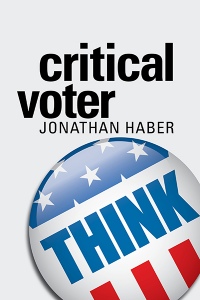News
New book: Critical Voter
Jonathan Haber, a member of the team helping to create the Woodrow Wilson Academy of Teaching and Learning, brings an eclectic background to his work at the WW Academy as well as to his new book Critical Voter.
 WW Perspectives: First off, what’s your role at the Woodrow Wilson Academy?
WW Perspectives: First off, what’s your role at the Woodrow Wilson Academy?
Jonathan Haber: I am the WW Academy’s Director of Learner Assessment, responsible for developing the assessment strategy for our new competency-based program. Since competency-based education is focused on outcomes instead of seat time, it’s vital that student attainment of outcomes be measured accurately, which is why the Academy’s assessments are being designed using professional assessment techniques.
WWP: What experience prepared you for this job?
JH: I ran a company for more than 20 years that developed performance-based assessments for employers and educators, which included developing a certification program for digital literacy currently used around the world. After selling that company, I worked in educational publishing and focused on my own educational research projects.
One of those projects, called Degree of Freedom, involved trying to complete the equivalent of a four-year bachelor’s degree in philosophy in 12 months using only Massive Open Online Courses (MOOCs) and other forms of free learning. Then I wrote a book on MOOCs for MIT Press and was HarvardX’s first Visiting Fellow, before getting the opportunity through Woodrow Wilson to put everything I’ve ever done to work towards the important cause of transforming educator preparation.
WWP: Tell us about your new book Critical Voter.
JH: This actually grew out of a curriculum I created in 2012, also called Critical Voter, which used the 2012 presidential election as a case study to teach critical thinking skills. That project was built around a series of podcasts tied to a curriculum that covered topics such as logic, persuasive communication, cognitive science, and information literacy which, taken together, constituted what I described as “practical critical thinking.”
WWP: What was the inspiration for this book ?
JH: The original material grew out of lessons I taught my own kids (now 13 and 16) when I realized that the schooling they were receiving, while excellent, didn’t focus on crucial thinking skills, despite how much educators and policy makers continually declared critical thinking to be of the utmost importance.
While many people “talk a good game” with regard to critical thinking, the overstuffed curriculum you see in most schools doesn’t provide room to teach skills like logic and rhetoric that once constituted what it meant to be an educated person. Turning Critical Voter into a book in time for the 2016 election provides a way to teach these skills in the context of the shared experience we’re all having during this presidential campaign season.
WWP: So is this a book for kids?
JH: While younger students can definitely benefit from learning Critical Voter skills , most readers—and most of the people who listened to the podcast lectures on which the book was based—are adults who never had the chance to learn this material, or who just needed a break from campaign craziness and wanted to use the election to improve their own thinking.
WWP: Are there any important lessons people should take away after reading the book?
JH: One lesson is that both ancient wisdom (like logic and rhetoric, codified by Aristotle) and modern science (like cognitive science principles) are equally relevant when it comes to becoming a critical thinker.
It’s also important to understand that critical thinking is a set of techniques one puts to use. While one can learn these techniques pretty quickly (both the original podcast and the book require less than 10 hours to complete), one must put those skills to work in order to make them part of the “muscle memory” of that critical “muscle” located inside the skull.
WWP: How might the work you put into Critical Voter fit with what you’re doing at the WW Academy?
JH: A key takeaway from Critical Voter is that critical thinking skills can be comfortably and confidently integrated into the teaching of traditional content (in this case, social studies/civics/political science content). This is an important lesson that the WW Academy will be teaching a new generation of educators as they prepare students to master both academic content and 21st century skills.
Interviews have been edited for length and clarity.

